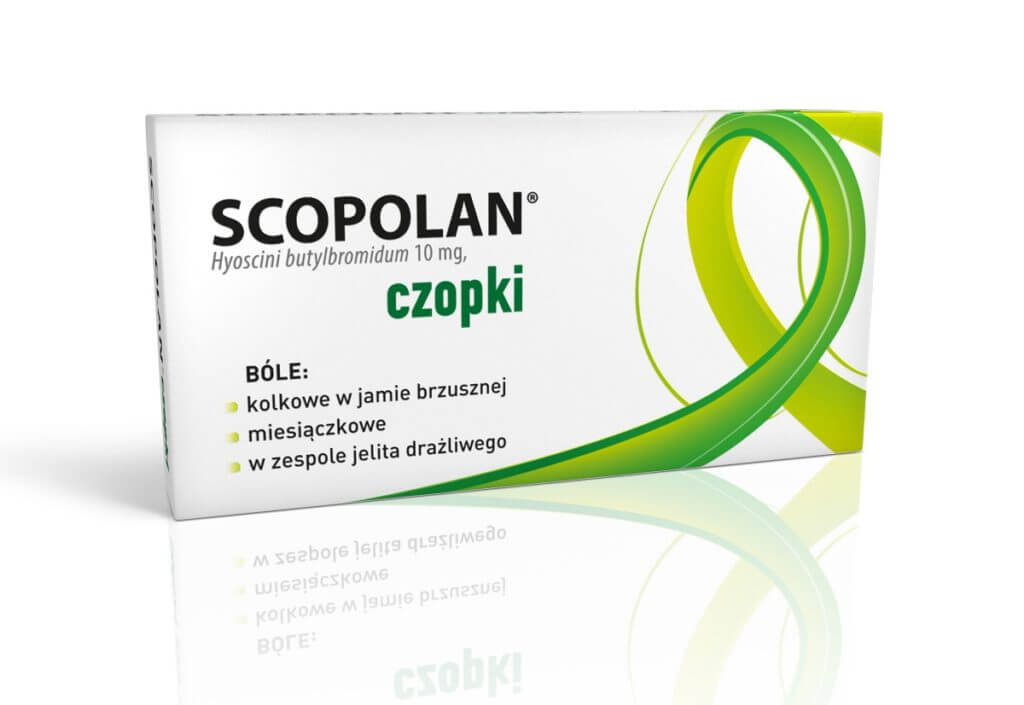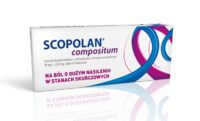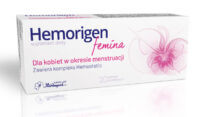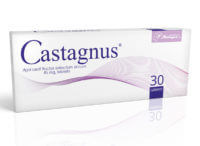
Scopolan ® suppositories
suppositories, OTC medicationScopolan is a drug containing hyoscine butylbromide, which cures contraction conditions of smooth muscles in the abdominal cavity. The diastolic effect alleviates painful contractions of the gastrointestinal tract, bile ducts and the urogenital system.
Indications of use
Scopolan is used in painful ailments in contraction conditions:
- gastrointestinal tract (e.g. stomach cramps, intestinal colic, irritable bowel syndrome),
- biliary tract (e.g. biliary colic),
- genitourinary system (e.g. renal colic, systolic conditions associated with ureterolithiasis, painful menstruation).
How to use Scopolan (suppositories)
Always use this medicine exactly as described in the patient package insert or as directed by your doctor or pharmacist. Always use this medicine exactly as described in the patient package insert or as directed by your doctor or pharmacist. The drug should be used only temporarily (in case of ailments).
Before use, tear the triangular end of the foil, remove the suppository from the blister and insert it into the rectum.
Recommended dosage
Adults and adolescents over 12 years of age:
- rectally 1 to 2 suppositories 2 to 3 times a day.
Children aged 6 to 12 years:
- rectally 1 suppository 2 to 3 times a day.
Always use the smallest effective dose.
If your symptoms occur longer than 3 days after starting treatment or intensify despite taking this medicine, you should stop taking this medicine and consult your doctor.
Before you take Scopolan
Do not use Scopolan if you are allergic to the active substance hyoscine butylbromide or any of the other ingredients of this medicine.
Do not use Scopolan if you suffer from:
- allergy to tropane alkaloids (e.g. atropine) and their derivatives,
- narrow angle glaucoma (eye disease with increased intraocular pressure),
- prostate proliferation (prostate),
- atonic constipation,
- paralytic intestinal obstruction (stopping the process of intestinal content movement),
- constriction of the esophagus, cardiac orifice or pylorus,
- the narrowing of the bladder neck,
- tachycardia (cardiac arrhythmia that occurs with cardiac functon acceleration),
- muscle nausea (myasthenia gravis) (a disease with impaired function and significant muscle weakness),
- pathological enlargement of the large intestine (megacolon).
Warnings and precautions
This medicine should be taken only temporarily (in case of ailments) in the recommended indications.
If you have sudden abdominal pain and the cause is unknown and you have fever, nausea, vomiting, changes in bowel movements (e.g. diarrhoea), pain while touching your abdomen, decreased blood pressure, fainting or the presence of blood in the stool, you should not take this medicine without consulting your doctor. In order to investigate the cause of the ailment, the doctor will recommend appropriate diagnostic tests.
You should discuss the use of Scopolan with your doctor if you suffer from:
- reflux disease of the oesophagus (throwing stomach contents into the esophagus),
- ulcerative colitis,
- ischaemic heart disease,
- narrowing of the mitral ostium (one of the valves in the heart).
Special care should be taken when using this medicine in elderly patients.
In case of any visual acuity disorders or eye pain caused by increased intraocular pressure, stop taking the drug and consult a doctor.
Due to the possibility of reducing sweat secretion, the drug should be used with caution in patients with fever.
Children and adolescents
Do not administer to children younger than 6 years of age.
For older children see “How to use Scopolan suppositories”
Scopolan and other medicines
Tell your doctor about all the medicines you are currently or recently taking, as well as the medicines you plan to take.
Before you start taking Scopolan, you should consult your doctor if you are taking:
- tricyclic antidepressants – clomipramine, amitriptyline (drugs used to treat depression),
- neuroleptics (antipsychotics) from the group of phenothiazine derivatives – chloropromazine, flufenazine; as well as clozapine and olanzapine,
- monoamine oxidase inhibitors (MAOs), e.g. selegiline, moclobemide, (some drugs used to treat depression and Parkinson’s disease),
- antihistamines (anti-allergic drugs), e.g. dimenhydrinate, klemastine,
- amantadine (a drug used to treat Parkinson’s disease),
- pethidine (a drug used in severe and prolonged pain),
- dysopyrimide (an antiarrhythmic drug used to treat irregular heartbeat),
- other cholinolytic drugs such as ipratropium or tiotropium (drugs used to treat chronic obstructive pulmonary disease) or other similar to atropine,
- drugs blocking dopamine receptors, e.g. metoclopramide (a drug used to treat stomach disorders),
- beta-adrenergic drugs (used to treat dyspnoea and asthma).
Pregnancy, breastfeeding and fertility
If you are pregnant or breast-feeding, think you may be pregnant or if you are planning to have a baby, you should consult your doctor or pharmacist before taking this medicine.
Pregnancy
There are no clinical tests confirming the safety of hyoscine butylbromide during pregnancy. The drug should not be used during pregnancy, unless the doctor deems it absolutely necessary.
Breastfeeding
No data are available on the transfer of hyoscine butylbromide to breast milk. This group of drugs may inhibit milk secretion, so administering Scopolan is not recommended in the period breastfeeding.
The effect on fertility is not known.
Driving and operating machines
During treatment, do not drive vehicles and operate machines, as the drug may cause impairment of psychophysical fitness and visual impairment.
Possible side effects
Like all medicines, Scopolan can cause side effects, although not everyone gets them. The medicinal product, when used in the recommended therapeutic doses, shall be well tolerated and any adverse reactions likely to occur shall be of moderate severity.
Adverse drug reactions are presented according to organ and system classification and frequency: not very common (affects less than 1 in 100 patients but more than 1 in 1000 patients); rare (affects less than 1 in 1000 patients but more than 1 in 10 000 patients); unknown (cannot be determined from available data).
During administering the Scopolan may occur:
skin and subcutaneous tissue disorders: erythema, skin burning, itching, rash, hives, swelling – not very common;
stomach and intestinal disorders: dry mouth, constipation – not very common;
cardiac disorders: tachycardia (heart rate acceleration) – not very common;
vascular disorders: hypotension (hypotension) – not very common;
renal and urinary tract disorders: anuria (urinary retention) – rare;
eye disorders: visual disturbances – rare;
disorders of the immune system: anaphylactic (allergic) reactions, anaphylactic shock (sudden and severe allergic reaction characterized by difficulties in breathing, significant drop in blood pressure, swelling, rash) – frequency unknown.
In case of any of the above mentioned symptoms, discontinue use of the drug immediately and consult a doctor.
Storage of the drug
Store in the temperature below 25°C.
Store the drug out of sight and out of reach of children.
Do not use this medicine after expiry date stated on the package.
Expiry date means the last day of the month.
Composition
The active substance is hyoscine butylbromide – 10 mg
The excipients are: solid fat, polysorbate 80, liquid paraffin, purified water.
Package size: 6 suppositories



